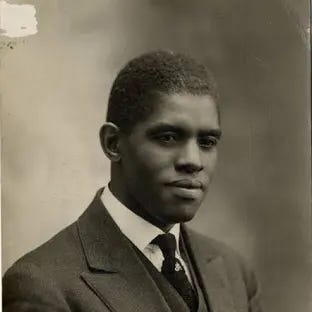Today In Black History: Roland Hayes
Internationally acclaimed 20th-century tenor
Issue #738 Today In Black History, Thursday, October 3, 2024
Did you know that you can listen to each “We Are Speaking” post on the Substack App? Download the app!
Please share and subscribe to help us grow our publication.
If you like us, REALLY like us, please click the “Like” button at the end of this post!
We appreciate your support!
Roland Hayes was born on June 3, 1887, in Curryville, Georgia, on the tenant farm his family owned. His mother was formerly enslaved. When Hayes was 11, his father died, and his mother moved the family to Chattanooga, Tennessee.
Hayes began his formal training at HBCU Fisk University in Tennessee, renowned for its music program. At Fisk, Hayes refined his vocal abilities and became a member of the Fisk Jubilee Singers, gaining initial exposure and experience. Hayes pursued further studies in Boston and Europe, facing racial prejudice and professional setbacks.
In the early twentieth century, Hayes shattered barriers to become one of the world's most celebrated tenors. In 1923, he became the first African American artist to perform with the Boston Symphony Orchestra.
In January 1915, Hayes premiered in Manhattan, New York City, in concerts presented by orchestra leader Walter F. Craig. From 1916 to 1919, Hayes performed his own musical arrangements in recitals, touring from coast to coast.
In 1923, Hayes was summoned by King George V and Queen Mary to give a command performance at Buckingham Palace.
After the 1930s, Hayes stopped touring in Europe because the change in politics and the rise of the Nazi Party made it unfavorable to African Americans.
Hayes finally secured professional management with the Boston Symphony Orchestra Concert Company, reportedly making $100,000 annually. In Boston, he also worked as a voice teacher. He eventually purchased the land in Georgia on which he had grown up.
In 1948, he published musical scores for a collection of spirituals, My Songs: Aframerican Religious Folk Songs Arranged and Interpreted.
Hayes's repertoire was diverse and sophisticated, encompassing classical German lieder, French chansons, and Negro spirituals. His ability to seamlessly blend these genres demonstrated his technical expertise and commitment to bridging cultural divides through music.
From the 1940s to the 1970s, Hayes did not perform much but continued yearly concerts at Carnegie Hall in New York and performances at Fisk and other colleges. In 1966, he was awarded the Honorary Doctorate of Music degree from The Hartt School of Music, University of Hartford.
Hayes performed until he was 85 when he gave his last concert at the Longy School of Music in Cambridge.
Dr. Roland Hayes died on January 1, 1977, five years after his final concert.
Today In Black History
In 1887, HBCU Florida Agricultural and Mechanical University (FAMU) was founded in a single building in Tallahassee, Florida, with 15 students and two instructors.
In 1904, Dr. Mary McLeod Bethune opened the Daytona Normal and Industrial School in Daytona Beach, Florida. In 1923, the school merged with the Cookman Institute and became HBCU Bethune-Cookman College.
In 1935, Ethiopia, one of only two independent African nations at the time, was INVADED BY Fascist Italy under Benito Mussolini, committing countless atrocities on the country.
In 1949, Jesse B. Blanton, Sr. founded WERD-AM in Atlanta, Georgia, becoming the first African American to own and operate a radio station in the United States.
In 1950, Ethel Waters became the first Black lead actress on a TV sitcom, “Beaulah.”
In 1956, Nat King Cole became the first Black person to host his own TV show.
In 1974, Frank Robinson was named manager of the Cleveland Indians and became the first Black manager in the Major Leagues.
In 1989, Art Shell was named head coach of the Los Angeles Raiders, becoming the NFL’s first Black head coach.
In 1995, O.J. Simpson was acquitted of murdering his ex-wife, Nicole Brown Simpson, and her friend, Ronald Goldman.
Our paid subscribers are encouraged to discuss this post in our W.A.S. Chat Community.
Join Pamela Hilliard Owens’s subscriber chat
Available in the Substack app and on the web
You are also welcome to view “We Are Speaking” in Substack Notes. You can also read other Substack publications without subscribing to them when you join Notes.






